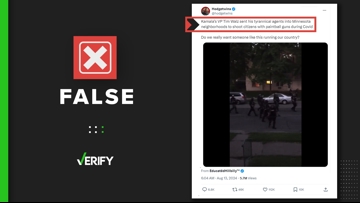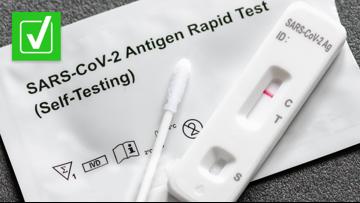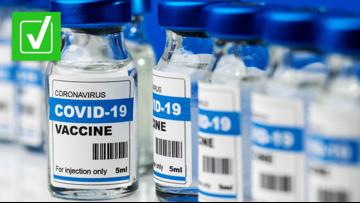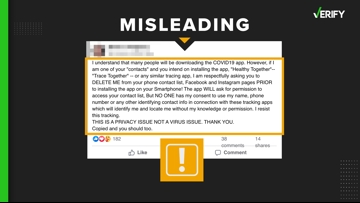A new school year is underway in many parts of the United States and in several school districts, children are meeting in person for the first time since the coronavirus pandemic was declared by the World Health Organization (WHO) on March 11, 2020.
As the highly contagious delta variant spreads rapidly across the country, the Centers for Disease Control and Prevention (CDC) is recommending universal indoor masking for all students over the age of 2, staff, teachers, and visitors to all K-12 schools in the U.S., regardless of their vaccination status. Now, many school districts that are attempting to enforce indoor mask mandates are being met with resistance from some parents who claim wearing masks can cause breathing issues for their children by trapping carbon dioxide inside of the masks.
THE QUESTION
Do masks increase carbon dioxide (CO2) levels for children?
THE SOURCES
- U.S. Centers for Disease Control and Prevention (CDC)
- American Academy of Pediatrics
- Johns Hopkins All Children’s Hospital
- Notice of Retraction. Walach H, et al. "Experimental Assessment of Carbon Dioxide Content in Inhaled Air With or Without Face Masks in Healthy Children: A Randomized Clinical Trial."
THE ANSWER
No, masks do not increase carbon dioxide (CO2) levels for children. Carbon dioxide molecules cannot be trapped by breathable materials like cloth or disposable masks, according to the American Academy of Pediatrics.
WHAT WE FOUND
According to the American Academy of Pediatrics, masks do not trap the carbon dioxide people normally breathe out. Dr. Kimberly M. Dickinson and Dr. Theresa W. Guilbert debunk this myth in an online article titled: “Mask Mythbusters: Common Questions about Kids & Face Masks.”
“There have been false reports that face masks can lead to carbon dioxide poisoning (known as hypercapnia) from re-breathing the air we normally breathe out. But this is not true,” the doctors wrote. “Carbon dioxide molecules are very tiny, even smaller than respiratory droplets. They cannot be trapped by breathable materials like cloth or disposable masks. In fact, surgeons wear tight-fitting masks all day as part of their jobs, without any harm.”
Dr. Dickenson and Dr. Guilbert say children under the age of 2 should not wear masks “since they may not be able to remove them without help.” They also mention that children with severe breathing problems or cognitive impairments may also have a hard time tolerating a face mask and extra precautions may be needed.
Johns Hopkins All Children’s Hospital also debunks the claim that wearing a cloth mask will make a child sick due to carbon dioxide poisoning on its website.
“When you exhale, carbon dioxide leaves your lungs and exits the body through your nose or mouth. Carbon dioxide is a gas made up of small molecules. These molecules are so small that they can pass through many materials, including the materials used to make masks. If you are using a medical-grade or cloth mask, carbon dioxide will pass through safely. It will not accumulate inside the mask or make you sick,” author Keeley LaForme wrote.
The American Academy of Pediatrics and Johns Hopkins All Children’s Hospital also debunk other mask myths related to children and adults on their websites.
SOURCE OF MISINFORMATION
A source of this claim can be traced to a research letter that has since been retracted.
On June 30, 2021, a research letter titled “Experimental Assessment of Carbon Dioxide Content in Inhaled Air With or Without Face Masks in Healthy Children: A Randomized Clinical Trial,” was published online in JAMA Pediatrics, an international peer-reviewed medical journal. It has been viewed over 820,000 times but has since been retracted by JAMA.
At the beginning of the research letter, author Dr. Harald Walach, and his colleagues wrote, “many governments have made nose and mouth covering or face masks compulsory for schoolchildren. The evidence base for this is weak.” Walach and his colleagues cited a survey conducted in Germany using data of 25,930 children that showed 68 percent of the participants claimed to have problems when wearing nose and mouth coverings.
The retraction of the research letter was published on July 16. After publication, numerous scientific issues were raised regarding the study’s methodology, including concerns about the applicability of the device used for assessment of carbon dioxide levels in the study setting, and whether the measurements obtained accurately represented carbon dioxide content in inhaled air, as well as issues related to the validity of the study’s conclusions, according to the notice of retraction.
“Given fundamental concerns about the study methodology, uncertainty regarding the validity of the findings and conclusions, and the potential public health implications,” the editors said they decided to issue the retraction because Walach and his colleagues did not provide “sufficiently convincing evidence to resolve these issues and other concerns” in their invited responses.












